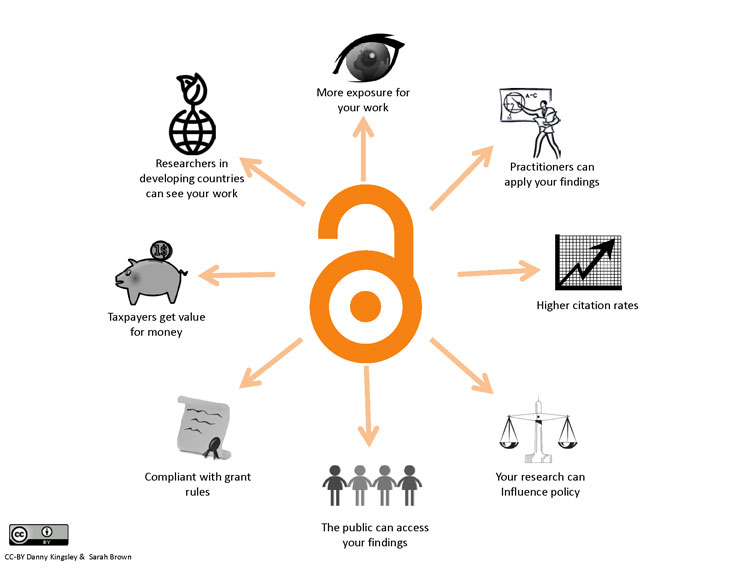Understanding Open Access
What is Open Access?
Open Access (OA) means that items of scholarly work are made available online, in a digital format, at no charge to the reader and with limited restrictions on re-use.
There are two ways of making your work OA:
1. Gold OA is where the:
- published work is freely available via the publisher’s website immediately on publication
- published work is normally published under a Creative Commons licence
- publisher may apply an Article Processing Charge (APC)
Our Open Access funding page explains the University’s Gold OA funds and eligibility criteria.
The University has agreements in place with a number of publishers which provide unlimited open access to papers with a University of Manchester corresponding author. You can find out more about the agreements and how to access them on the Transformative Agreements page.
2. Green OA is where the:
- published work is freely available via an institutional or discipline-specific repository
- version of work made available may be pre peer-review (pre-print, draft) or post peer-review (Author Accepted Manuscript or publisher's)
- version deposited may be subject to a publisher's embargo, though all papers accepted from March 1st 2023 can be made Open Access immediately on publication via rights retention.
- article is made OA without payment of an APC
Our Share your research page explains how to deposit your output to the University’s repository, Pure, and provides information about discipline-specific repositories.
3. Diamond OA:
Diamond OA refers to academic journals or scholarly publications that allow for immediate access to the final published version of an article without the payment of an APC.
Diamond OA journals are increasingly becoming an important part of the scholarly publication environment, with many highly regarded OA publications using this model, as evidenced by a recent in-depth cOAlition S study. A good source for authors looking for reputable Diamond OA publications is the Directory of Open Access Journals (DOAJ), with over 13,000 listed fully OA journals not requiring the payment of an APC.
If you have any questions about Diamond OA publishing, or OA in general, you can contact the Library OA team.
Benefits of Open Access

- Why Open Access (Accessible version of diagram, PDF)
Open Access policies
Research England (REF OA)
This policy affects submissions to the next Research Excellence Framework (REF) exercise. It is a Green OA policy and authors are not required to pay APC fees to publishers to comply with the policy.
What the policy says
- To be eligible for submission to the REF, all journal articles and peer-reviewed conference papers must be:
- deposited in an approved repository within three months of acceptance
- subsequently made OA
- Papers can be embargoed for up to 12 months (REF Panels A & B) or 24 months (REF Panels C & D)
Author actions
On acceptance:
- Deposit the Author Accepted Manuscript (AAM) to Pure via the Open Access Gateway.
N.B.: Papers published Gold OA automatically meet the policy requirements. It is not necessary to deposit AAMs for these papers in a repository, unless the paper acknowledges funding from the ERC, including FP7 and Horizon 2020 grants. Authors wishing to request institutional funding to cover Gold OA costs should use the OA Gateway to do so.
The Library will ensure that papers deposited within three months of acceptance meet the OA requirements to be eligible for the next REF.
University of Manchester Publications Policy
This policy applies to all Manchester researchers and research students.
What the policy says
- All peer-reviewed research articles and conference proceedings with an ISSN must be Open Access (OA).
- Where a funding body requires it, other publication types must also be OA, including monographs and book chapters.
Author actions
On acceptance:
- Deposit the Author Accepted Manuscript (AAM) to Pure via the Open Access Gateway within three months of acceptance.
Access the policy document:
